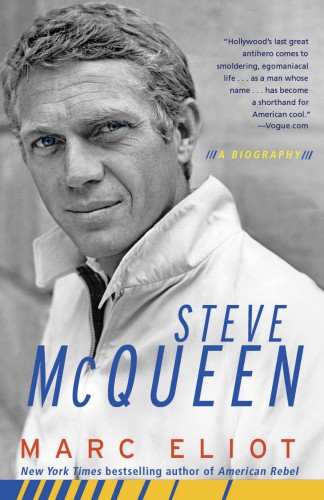
Steve McQueen
A Biography
کتاب های مرتبط
- اطلاعات
- نقد و بررسی
- دیدگاه کاربران
نقد و بررسی

June 27, 2011
Following his biographies of Cary Grant, Jimmy Stewart, Walt Disney, Phil Ochs, and others, Eliot now traces the "tragically short" career of McQueen, ranking him as "one of those actors, who, along with Eastwood and Newman, became a seminal force in the wake of the postwar Brando cinematic tsunami." This uneven biography devotes only a few pages to McQueen's turbulent, troubled youth (including 14 months in reform school), quickly moving on to Broadway, where he appeared in A Hatful of Rain. In 1958, after the top-10 success of his Wanted: Dead or Alive series on CBS, McQueen became "Hollywood's number one hotshot." During the 1960s, he ascended as a superstar in such films as The Great Escape, The Cincinnati Kid, The Sand Pebbles (which brought him an Oscar nomination), and Bullitt, moving into the 1970s with The Getaway and Papillon. By 1974, he was the world's highest paid actor, indulging in "drugs, fast cars, faster women" and confrontational, "idiosyncratic behavior'' on film sets. Eliot manages to capture the powerful drive and rough-hewn qualities of the adventurous actor, but many pages rehash the same anecdotes found in a dozen previously published McQueen biographies.

August 1, 2011
On-screen and off with the "King of Cool."
Veteran celebrity biographer Eliot's (Paul Simon: A Life, 2010, etc.) portrait of film star Steve McQueen (1930–1980) is a curiously sour reading experience. The subject emerges as a singularly petty and unpleasant personality, a minor talent who left a meager cinematic legacy completely out of proportion with his enduring status as an icon of mid-20th-century "cool." In this telling, McQueen's less-than-impressive filmography is the result of the star's persistent small-mindedness, as he habitually gravitated toward working with directors he could dominate and turned down promising roles—he could have been the Sundance Kid, but walked when he couldn't get top billing over rival Paul Newman—out of spite, laziness and easily injured ego. A hardscrabble childhood led to a period of small-time criminality and military service before McQueen drifted into acting, attracted to the profession for its many opportunities to smoke dope and sleep with pretty young actresses. He made a hit with the TV series Wanted: Dead or Alive, in which he perfected a sullen, wary, catlike screen presence that radiated charisma and danger, and he would keep sounding those same few notes throughout his career. Eliot praises McQueen's iconic impact in such films as The Magnificent Seven, Bullitt and The Getaway, but these successes come off as lucky intersections of good timing and congenial material rather than the expression of a significant artistic talent. Eliot's matter-of-fact recounting of McQueen's gluttonous appetite for drugs, compulsive womanizing, sickening instances of wife-beating and petulant bullying are difficult to stomach, as they seem less like the torments of a complicated artist than the sordid habits of a profoundly spoiled, selfish, bitter man. The author writes of McQueen poring over the script of The Towering Inferno, counting his lines to make sure that co-star Paul Newman didn't have more to do and childishly insisting on delivering the last line of the film. That about sums it up.
A dispiriting account of a great star and not-so-great human being.
(COPYRIGHT (2011) KIRKUS REVIEWS/NIELSEN BUSINESS MEDIA, INC. ALL RIGHTS RESERVED.)

August 1, 2011
Eliot has authored several celebrity bios, including American Rebel: The Life of Clint Eastwood. Here he focuses on Steve McQueen, whom he can't help but compare to Eastwood. They were both born in 1940, and their careers began at about the same time. But unlike Eastwood, whose acting style is instinctive and who has essentially played the same character to great commercial success, McQueen was a product of the Method; Eliot asserts his career was hampered by less-than-inspiring directors and his early death at 50, when Eastwood was just hitting his stride. Still, McQueen starred in iconic films (The Magnificent Seven; The Great Escape). Eliot covers McQueen's lonely and angry early life and the juicy details of his marriages, most famously to Ali MacGraw. VERDICT Eliot's penchant for portraying the thoughts of McQueen and others ("From the moment Steven arrived in New York City, nothing felt right") is annoying, but McQueen's life and the cultural context Eliot explores make for a good read. Several McQueen biographies have appeared over the last few years; purchase for need and demand.--Rosellen Brewer, Sno-Isle Libs., Marysville, WA
Copyright 2011 Library Journal, LLC Used with permission.

September 15, 2011
In one sense, this lively biography of Steve McQueen tells a familiar Hollywood story. A young man stumbles into acting, then moves from job to job until falling into the role that makes him a star. But in another sense, it offers something quite fresh, simply because McQueen, who died of cancer in 1980, hasn't been in the public eye for more than three decades. Most readers will recognize him as a movie star (Bullitt, The Great Escape), but his personal life is less well known. His reputation as a womanizer, we learn, is probably justified, but he may not have been the egotist some have claimed. Rather, he was a perfectionist almost self-destructively determined to prove that he was a legitimate actor. Surprisingly, McQueen passed up a lot of good moviesThe French Connection and Apocalypse Now, among othersand it's interesting to imagine how his career might have been different had he said yes to one of those now-classic films. A fine biography that makes us feel like we know and understand its subject.(Reprinted with permission of Booklist, copyright 2011, American Library Association.)

























دیدگاه کاربران